| |
|


JEWISH GREEN
Global warmth: Is Bible really to blame?
By Marissa Palin
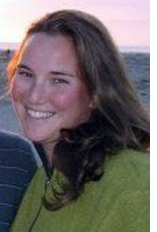 LA JOLLA, California -- As many Environmental Studies majors can tell you, Lynn White, Jr. left an everlasting mark on the environmental movement, arguing that the Bible is at the root of today’s environmental crisis. Many environmentalists today have come to adopt that same belief, arguing that religion and the Bible teach that man has dominance over the earth, and therefore has permission to misuse, destroy, and control our environment. LA JOLLA, California -- As many Environmental Studies majors can tell you, Lynn White, Jr. left an everlasting mark on the environmental movement, arguing that the Bible is at the root of today’s environmental crisis. Many environmentalists today have come to adopt that same belief, arguing that religion and the Bible teach that man has dominance over the earth, and therefore has permission to misuse, destroy, and control our environment.
For those of you who have seen Al Gore’s An Inconvenient Truth, you know that the 10 hottest years ever measured have all occurred within the last 14 years. You know that within the decade, there will be no more snows of Kilimanjaro. You know that temperature increases are taking place all over the world, resulting in much stronger storms across the globe, and that mankind is the cause. But is the Bible really responsible for all of this? Is it because of what religion teaches us that we continue to bury ourselves deeper into this void?
According to Ellen Bernstein, also known as the birth-mother of the Jewish environmental movement, the Bible has nothing to do with the environmental crisis. In fact, according to Bernstein’s interpretation, the Bible condemns the current environmental crisis we are facing. On Sunday, January 27, I was fortunate enough to spend a small portion of my afternoon learning about the relationship between the story of creation and the Jewish environmental movement. Ellen Bernstein’s lecture at Limmud, a day of learning sessions sponsored by the Agency for Jewish Education, explored the story of Genesis, Chapter 1, from an ecologist’s point of view.
Bernstein began by having the people in the audience close their eyes while she read aloud her translation of Genesis I. She told us to listen as an ecologist would, listening for all things related to our environment. With my eyes closed and with Bernstein’s soothing voice guiding my thoughts, I saw greens and blues and browns. I saw the earth, the trees, the waters, the fish, the winged creatures, and I saw beauty.
After story time, Bernstein discussed each day of creation. She pointed out the very first thing created in the Bible were our natural habitats. In day one and the first part of day two, G-d created the heaven and earth, and light and dark. As any ecologist could tell you, we can’t live without our natural habitat and without the energy of the sun. The Bible recognizes that as well. Fast forward thousands of years, and recognize that this is the same natural habitat suffering today from temperature increases, rising sea levels, stronger storms and prospective water shortages.
In day three of the story of creation, G-d said “Let the earth sprout sprouts, grass seeding seed and fruit tree making fruit…” (Genesis 1:11).* Bernstein was quick to point out that G-d didn’t say He would create sprouts and seeds, but rather He said to let the earth create it. What does this tell us? The earth is alive. This passage empowers the earth, giving it an equal responsibility in the story of creation. This occured again in day five, when G-d said “Let the waters swarm with swarming living souls, and let flyers fly above the earth…” (Genesis 1:20). Again G-d alluded to the fact that water and sky are alive, generative and involved in the creation process.
Now back to modern times, when we are in what Bernstein calls “an environmental crisis of inordinate proportions.” Perhaps if we followed the teachings of the Bible and understood that the earth is alive, we would be quicker to protect it.
Now let me present you with a little question. Who was the first to receive a blessing from G-d in the Bible? Go on, answer. Many of you, along with the audience at Limmud, said Adam. But as Bernstein pointed out, G-d first blessed the animals. The first blessing came on day five, Genesis 1:22, and Adam was not created until day six. G-d said “Be fruitful and multiply and fill the waters in the seas and let the winged creatures multiply on the land.” Through His blessing G-d envisioned an earth that continuously creates, an earth of sustainability. Not like today, where hundreds of species go extinct every year because of human actions and habitat destruction.
At the end of each day, the Bible comments “And G-d saw that it was good.” What does goodness mean? It means G-d was satisfied. It means that there was integrity in what was created. That everything was created for a purpose, for a reason. It means we should think twice about destroying the earth we live for.
In day six, G-d created man. By then the habitats had all been created, and were swarming with plants, animals, and goodness. Then G-d said “Let us make Adam in our image, after our likeness, and let them have dominion over the fish of the sea…” (Genesis 1:26).
First, who was us? Was it the angels? Was it the four winds? Or was it everything G-d has created up until this point? If so, if man was actually created in the image of all animals, plants, and habitats, what does that say about our role on this earth? And what did G-d mean by “dominion”? A fellow audience member raised her hand to give an answer I will forever hold dear: A common theme in the story was G-d would create, and then hand over the responsibility. G-d created the earth, and then gave it the responsibility to provide for the sprouts, seeds, and trees. G-d created the waters and the sky, and then gave them the responsibility to provide for the fish and the birds. Then G-d created man, and gave him the responsibility to provide for “the whole earth and over every creeping thing that creeps on the earth.” G-d was telling us to protect the earth.
At the end of the sixth day, the Bible tells us “And G-d saw that everything that G-d had made and behold, it was very good.” For the first time in the chapter, things weren’t just good, but they were very good. Some would argue that’s because G-d had finally made man. But the Bible doesn’t say “And G-d saw that man was created and it was very good.” The Bible tells us that everything was created and it was very good. For the first time, everything was all together, interrelated and coexisting. It was all very good. On the seventh day, G-d set an example for us by honoring creation, and letting it rest.
Now back to Lynn White. Does the Bible give humanity the right to control, dominate and destroy our environment? Is religion to blame for the environmental crisis we are faced with? Not at all. Instead, the Bible teaches us to cherish our environment, to live as one with the earth and all its inhabitants. Religion teaches us to recognize the earth as holy, and to appreciate and protect its beauty.
As Jews, it’s our responsibility to care for the environment in which we live. It’s up to us to work harder to protect the beauty we are surrounded by, the beauty we are meant to appreciate every Shabbat. So the next time you go to the grocery store to buy a case of plastic water bottles, think of the story of Genesis. The next time you throw the newspaper in the trash instead of the recycling bin, think of how G-d gave us the trees and told us to be fruitful, multiply, and replenish. The next time you see someone throw a cigarette butt on the beach, think of how we were given the responsibility to care for earth’s creatures. The first step is awareness.
*All quotes from the Bible come from Ellen Bernstein’s biblical translation handout.



18TH ANNUAL SAN DIEGO JEWISH FILM FESTIVAL
Storyline, editing, teaching potential are
all criteria for whether a film is chosen
By Francine Ginsburg
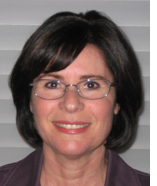 LA JOLLA, California—After hitting the half century mark, I began to think about the second half of my life. I wasn't ready yet to plan Jewish weddings for my daughters or think about being a grandparent. However, my good friend, Joyce Axelrod, co-founder of the San Diego Jewish Film Festival, asked me to attend the film festival wrap-up meeting in the spring of 2001. Other than Joyce, I didn’t know anyone in the room. That would soon change. LA JOLLA, California—After hitting the half century mark, I began to think about the second half of my life. I wasn't ready yet to plan Jewish weddings for my daughters or think about being a grandparent. However, my good friend, Joyce Axelrod, co-founder of the San Diego Jewish Film Festival, asked me to attend the film festival wrap-up meeting in the spring of 2001. Other than Joyce, I didn’t know anyone in the room. That would soon change.
My involvement with the film festival began slowly. I joined the film selection committee in the Fall of 2001 and took on the role of Chair for Guest Hospitality. Before I knew it, I was knee deep in the festival and have never looked back.
Our film selection committee consists of eight dedicated volunteers in addition to our curator, Ilise Gersten Bush and our producer, Sandra Kraus. Our criteria for film selection is always our audience. Does the film have a good storyline? Is it well edited? Is there something to be learned? Is it, overall, a positive Jewish experience? Considering the fact that we sell in the neighborhood of 20,000-25,000 tickets to these Jewish movies, this is a daunting responsibility.
 This year, at the 18th San Diego Jewish Film Festival sponsored by the Mizel Family Foundation, we are celebrating two milestones. This is our 18th year – Chai – and at the same time we pay tribute to the 60th anniversary of Israel’s existence. At least a third of approximately three-dozen films in the festival are features and documentaries from Israel due to its high quality of movie-making. This year, at the 18th San Diego Jewish Film Festival sponsored by the Mizel Family Foundation, we are celebrating two milestones. This is our 18th year – Chai – and at the same time we pay tribute to the 60th anniversary of Israel’s existence. At least a third of approximately three-dozen films in the festival are features and documentaries from Israel due to its high quality of movie-making.
As can be seen in the film festival's brochure, there are a few themes this year. One is coming-of-age films of which we have several. Our opening night film, Sixty-Six is just one of these films. It is a British film, humorous, and heartwarming about a young boy planning his bar mitzvah. We will show this film twice, on opening night, Thursday, Feb. 7 at 7 p.m. at AMC 12 La Jolla and again at UltraStar Hazard on Sunday, Feb. 10 at 7:30 p.m.
Dear Mr. Waldman is a beautifully crafted Israeli film. The story takes place in the 1960’s outside of Tel Aviv where a 10 year old boy wants nothing more than to make his parents happy. They are both Holocaust survivors and the family relationship is something to cherish. Dear Mr. Waldman is playing Saturday, Feb. 9 at 8:45 p.m. at UltraStar Hazard and again on Saturday, Feb. 16 at 8:45 p.m. at AMC 12 La Jolla.
Not All Were Murderers is a German Holocaust film that follows the lives of a mother and son as they try to hide inside Nazi Germany. It is very suspenseful and is based on the life of actor, Michael Degen. Not All Were Murderers is being shown on Wednesday, Feb. 13 at 5:00 PM at AMC 12 La Jolla.
Love & Dance is another coming of age movie that we showed at our film festival kickoff event last August. It was so well received that we are bringing it back for a bigger audience. This is an Israeli feature film that deals with the new Russian immigrant in Israel. The story follows the lives of several teenaged ballroom dancers, both Sabras and Russian immigrants. The dance studio is run by a Russian couple who must deal with their own relationship within the confines of the studio and their adopted land, Israel. We are lucky to have with us, Evgenia Dodina, who plays the role of the Russian instructor. The film will be shown on Sunday, Feb. 17 at 4 p.m. at UltraStar Poway.
The second theme that is evident in our festival is a celebration of the role of women. There are five films that fit into this category. They are, Aviva My Love, Arranged, Making Trouble, Three Mothers, and She’s Got It. Three of these—Aviva My Love, Three Mothers, and She’s Got It— are Israeli movies.
Aviva My Love is one of my favorites. It is the story of a woman in her prime. Aviva is trying to fulfill her dream as a writer but at the same time she is the sandwich generation, dealing with out-of-control teens and aging parents. It is showing on Thursday, Feb. 14 at 4:30 p.m. at AMC 12 La Jolla.
Three Mothers is the story of triplets born in Egypt but are raised in Israel. The three sisters are very different from each other yet their sisterhood binds them together. When they all go to visit their daughter/niece who has a business that produces video for posterity, the three sisters tell the same story only differently. It is a movie not to be missed. Three Mothers is playing twice, once on Saturday, Feb. 9 at 6:15 p.m. at UltraStar Hazard and again on Sunday, Feb. 10 at 7:30 p.m. at AMC 12 La Jolla.
Making Trouble is produced by the Jewish Women’s Archive and is our closing night film. Unfortunately, it is nearly sold out and individual tickets will be sold at the performance, space permitting. But don’t panic, we are already talking about bringing this film back in May to the David and Dorothea Garfield Theatre at the JCC for those who won’t have a chance to see it during the film festival. Making Trouble is a documentary that highlights the lives of six female Jewish comedians, Molly Picon, Fanny Brice, Sophie Tucker, Joan Rivers, Gilda Radner, and Wendy Wasserstein and their contributions to comedy. Our guest comedian will be Carrie Snow who will certainly tickle your funny bone. It is playing Sunday, Feb. 17 at 7:30 p.m. at AMC 12 La Jolla.
The last and final theme is the Holocaust. Over the years, we have heard from a number of people who say they won’t go see another film about the Holocaust because the subject is just too depressing. To this day, there are so many Holocaust films being produced around the world with new stories to tell. The movies that we have chosen are not full of archival photos of Jews being led to slaughter or pictures of train tracks delivering the Jews to their final destination. Instead, we have chosen Holocaust films because of their startling new content and excellent or revolutionary filmmaking. Movies that fall into this category include, As Seen Through These Eyes, The Diary of Niclas Gheiler, Not All Were Murderers, and A Love to Hide.
The Diary of Niclas Gheiler is a 20 minute short playing with the beautifully written and filmed As Seen Through These Eyes. The filmmaker’s grandfather served in the German army during WWI with Adolph Hitler. It is the life story of Niclas Gheiler in Germany and South America using mesmerizing filming techniques. As Seen Through These Eyes and The Diary of Niclas Gheiler will be shown on Tuesday, Feb. 12 at 4:30 p.m. at AMC 12 La Jolla.
Lastly, A Love to Hide is a feature film from France that will have you sitting on the edge of your seat. This movie is a love story of a homosexual couple in Paris who agree to hide a young Jewess that has lost her family. There are so many twists and turns to this plot that you must see it to believe it. A Love to Hide is playing Tuesday, Feb. 12 at 7:30 p.m. at AMC 12 La Jolla.
If you have a passion for documentaries, here are several that are must sees. One is called The Eternal Light: A Historical Perspective, a documentary that relates the story of the radio and television series that was created by the Jewish Theological Seminary to introduce the eternal relevance of Judaism to Jews and Gentiles in the United States. It is playing on Thursday, Feb. 14 at 12:00 noon at AMC 12 La Jolla.
Another documentary is Encounter Point which follows the lives of Israelis and Palestinians who have lost loved ones to violence and war and come together on common ground in the Bereaved Family Forum in Israel. This film will be shown twice, once on Sunday, Feb. 10 at 1 p.m., UltraStar Hazard and Wednesday, Feb. 13 at 12 noon at AMC 12 La Jolla.
So Long Are You Young is the story of Samuel Ullman who wrote a poem called Youth. This poem has circled around the world and has inspired many to do great things. So Long Are You Young is playing Sunday, Feb. 17 at 4:30 p.m. at AMC 12 La Jolla.
And before I end this, I must tell you about the wonderful documentaries that will be highlighted at The Joyce Forum on Monday, Feb. 11 at AMC 12 La Jolla. We will show three feature length films that are not only directed by emerging filmmakers but they will all be in attendance. Don’t be fooled that these films are anything but professional. Hava Volterra will be present for The Tree of Life at 12:00 noon, Guy Meroz and Orli Vilnai, Israeli journalists, will be present for Paying for Justice at 5:00 p.m., and Ilana Trachtman will be present for Praying with Lior at 7:30 p.m.. Don’t miss out on sensational programming!
Ten Jewish Festival films reviewed on site
SAN DIEGO—Over the past several weeks, ten films to be shown at the San Diego Jewish Film Festival have been previewed on this site by Donald H. Harrison, editor and publisher of San Diego Jewish World.
More previews will be placed on the site in the coming weeks. Here are links to those which have run so far: Arranged; As Seen Through These Eyes; Dear Mr. Waldman; The Galilee Eskimos; Love and Dance; Making Trouble; Marti: The Passionate Eye; Orthodox Stance; Praying With Lior; and Sixty-Six.
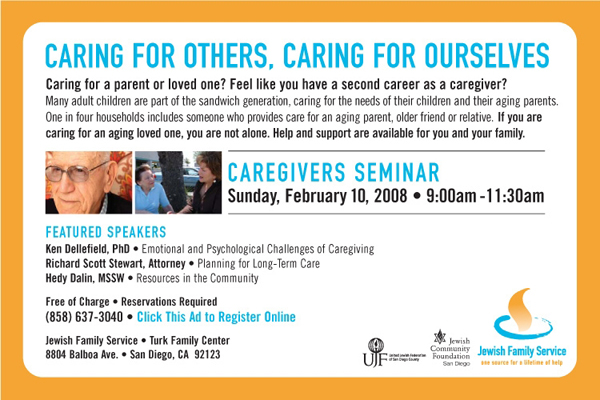
THE JEWISH CITIZEN
When civic and religious duties clash
By Donald H. Harrison
 NATIONAL CITY, California—I had the opportunity yesterday to tell a familiar story about the Jews of San Diego County to the Tijuana-San Diego chapter of the Women’s International Zionist Organization (WIZO’s) meeting at the Ken Jewish Center. But I received a different response to than story than I usually do. NATIONAL CITY, California—I had the opportunity yesterday to tell a familiar story about the Jews of San Diego County to the Tijuana-San Diego chapter of the Women’s International Zionist Organization (WIZO’s) meeting at the Ken Jewish Center. But I received a different response to than story than I usually do.
The Ken Jewish Center serves as a communit center for San Diego County’s Spanish-speaking Jews. It was established to permit Jews of Latin heritage who have immigrated to the United States to retain their culture, which tends to be more resistant to assimilation than that of Southern California Jewry. As my Spanish is perhaps only good enough for ordering a meal at a Mexican restaurant, I was permitted to deliver my speech in English, which the 15 ladies present all spoke.
The story was one that I recently had the privilege of telling on KPBS Television as a local sidebar to the recent three-part national PBS series on American Jewish history. It concerned an event in 1859 that has become known as the “San Diego Incident.”
In brief, a grand jury was convened the same day that the Jews of San Diego were observing the High Holidays at the Franklin Hotel, then the small town's skyscraper at the breathtaking height of three stories. The grand jury was trying to decide who was at fault in a routine assault. It was established that Moses Mannasse had been a witness to the matter. As the courtroom was only two doors away from the Franklin House (in what is today Old Town San Diego State Park), it seemed a simple matter to summon Mannasse.
But when Mannasse was asked to come to give his testimony, he refused, explaining that this was a sacred Jewish holiday; that Jews needed a minyan of ten men to pray, and as he was the tenth man he couldn’t possibly go. Told what Mannasse said, the Grand Jury instructed the sheriff to nevertheless fetch Mannasse. However, Mannasse continued to refuse. Finally, the sheriff deputized a posse, and its members escorted Mannasse from the services to the witness chair.
Once seated, Mannasse folded his arms over his chest and declined to testify—until sundown when the holiday was over. He then told the grand jury what he knew about the assault.
The owner of the Franklin Hotel, Lewis Franklin, was a devout English Jew who was incensed by the treatment accorded to Mannasse specifically and to the small Jewish community generally. Given to hyperbole, Franklin suggested in letters to Jewish newspapers around the country that this was one of the worst insults ever to Jewry—apparently akin in his mind to the Romans’ sacking of the Holy Temple in Jerusalem in 70 CE.
Franklin’s anguished letter set off a debate in various parts of the United States. Was Mannasse, in the fact that he was asserting his religious beliefs, right to have refused to testify? Or should he simply have asked his co-religionists to take a brief recess, given his testimony, and then have returned to the services?
Usually, when I pose this question to groups to whom I speak—or who join me on a Jewish tour of Old Town San Diego State Park—the opinion is divided about 70 percent in favor of Mannasse’s course of action, and 30 percent opposed.
When I asked the women of WIZO how they felt, however, the verdict was unanimous. Mannasse was absolutely, 100 percent, right.
I commented that this was the first time I had seen complete unanimity on the question. One of the women in attendance responded that this might be a reflection of the difference between the Jews of Mexico and those of the United States.
The Jews of Mexico are Jews first, Mexicans second, she said. That is the way the society treated them and the way they thought of themselves.
On the other hand, she suggested, Jews in the United States often think of themselves as Americans first, Jews second. And thus the difference.
Perhaps she was right, but as for myself, I have never thought that I could put my nationality and religion into either 1-2 order. Although both my parents were Jewish, I always thought of Judaism as my spiritual mother and the United States as my spiritual father. So, whose son was I? Obviously, both!


Economics account for some Hindu and Jewish ritual; Zen offers a way to adapt
By Reut Schwartz-Hebron
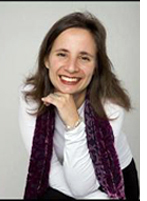 SAN DIEGO-- Recently I made the mistake of watching the movie Water by the writer and director Deepa Mehta. It's a brilliant movie, and that's exactly why, with my sponge- like capacity for suffering, I should have avoided it. SAN DIEGO-- Recently I made the mistake of watching the movie Water by the writer and director Deepa Mehta. It's a brilliant movie, and that's exactly why, with my sponge- like capacity for suffering, I should have avoided it.
The movie is about the life of widows in 1938 India around the time Mohandas K. Gandhi started his battle to change some of the social laws in India. At that time widows in India had three options:
- Burn with their dead husband (horrifying thought in my mind, even more so because most low income families married their daughters to older men at a very young age)
- Join a community of other widows and live a life of poverty and humiliation as an outcast in society or
- Marry their dead husband's brother (or should I say turn into his property)
It's interesting to see that in Judaism one option facing a widow is somewhat similar. I would like to believe that in Judaism the custom of marrying the deceased husband's brother- an act called Yibum-- stems from an attempt to protect the widow. But clearly both religions are also motivated by economic considerations, otherwise why not send the girl back to her family and let her start a new life, remarry and live a full life? Instead it's all about property and money.
Clearly, religious and social values are heavily influenced by economic factors. I remember my macro-economics professor at the Tel Aviv University Business School saying that the number of divorces is directly linked to women's ability to provide for themselves- and that's just one of the more obvious implications. There are ways to work within such an economic framework, rather than beating one’s head against it.
If we stop fighting it, if we acknowledge the power of money as factual , we can start addressing some very important questions in a different light. Instead of trying to convince people of influence that they should have other values, we should start talking about the challenge in business terms. For example, we might ask:
1. “How is creating equality in society better for business?”
2. “Is there a way to turn kindness into a lucrative management style?”
3. “What are the economic benefits of caring for our environment?”
Some may wonder why I think it's a good idea to embrace this understanding. The reason is simple: Accepting reality as it is opens the opportunity to make changes within the structure instead of fighting it. It's a Zen way of making a difference.
I believe there is a way to bring spirituality and money into alignment and that if we are to survive- this is going to be one of the most important challenges of our leadership in the coming years.
In brief, here are my answers to the three questions above:
1) It's all about opportunities. If you build a road to a forgotten farm, soon hotels will be built, people can get higher education because they can travel and the economy will grow. Equality in society helps any market develop its natural talent and depend less on outsourcing.
2) Kindness gives people a sense of value which in turns allows them to reach inside themselves and share more of who they are. It is the basis of all forms of creativity and growth. Research, as well as common sense, indicate that happier employees are more productive, so why not bank on that?
3) Though in the short run investing in environmental efforts is costly, when a home or a business invests in "greening up" it's also investing in a high return-on-investment for the long run. Imagine making a profit by helping others to profit from reduced electricity and gas bills?
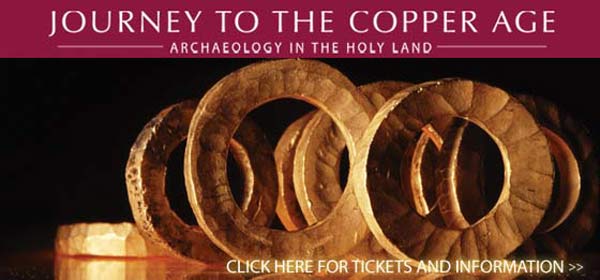


SAN DIEGO JEWISH WORLD THE WEEK IN REVIEW
Shoshana Bryen in Washington D.C.: Gaza chaos likely to metastasize, posing new dangers to Israel, U.S. forces, Egypt (A report by Lenny Ben-David)
Cynthia Citron in Los Angeles: Last Days of Judas Iscariot lasts and lasts
Carol Davis in San Diego: Ion scores with The Pillowman
Peter Garas in Canberra, Australia: Tired of telephone solicitors? Try handling them with some old fashioned chutzpah
Donald H. Harrison in La Jolla, California: Ethiopian Jew's show a comical eye-opener
J. Zel Lurie in Delray Beach, Florida: Should Allies have bombed Auschwitz?
Shoshana Bryen in Washington, DC: Should Gaza be made a U.N. protectorate?
Peter Garas in Canberra, Australia: Palestinians should consider emigrating to lands where there are real opportunities
Norman Greene in San Diego: England is the most anti-Semitic country in Europe, Dershowitz tells news media
Donald H. Harrison in San Diego: JFS programs, including youth-run food pantry, flourish at Turk Family Center
Rabbi Baruch Lederman in San Diego: When questions of halacha are posed to embarrass rather than to learn
Rabbi Leonard Rosenthal in San Diego: Taking our mother's Hebrew name too
Shoshana Bryen in Washington, DC: Why Gaza finds itself in the mess it's in
Donald H. Harrison in Poway, California: JFS North County Inland Senior Center is a place for physical and mental exercise
Sheila Orysiek in San Diego: Sabbath Amphitheatre: Celebrating Creation in Sequoia National Park
Shoshana Bryen in Washington, DC: U.S. arms for Saudi Arabia not in the best interests of the United States, nor Israel
Carol Davis in San Diego: 'Tranquility' never really comes together
Donald H. Harrison in San Diego: A special artists' view of the Holocaust
Ira Sharkansky in Jerusalem: Yaalon plan ignores Palestinian realities
< BACK TO TOP
|
|

